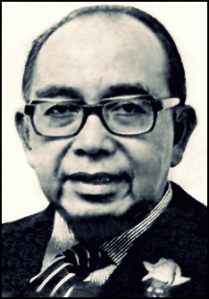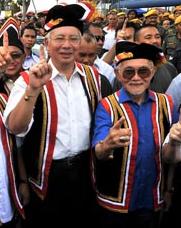By Chin Huat-Wong
On May 13, 1969, the Malaysian capital of
Kuala Lumpur was a living hell with vehicles, houses and the national
consciousness set ablaze. Clashes between ethnic Malays and Chinese
claimed 196 lives according to official police estimates. Independent
foreign observers estimated the death toll as ten times higher.
 Triggered by the outcome of the 1969
elections, that riot paved way for two years of emergency rule and a
fundamental change in politics and society. The then ruling Alliance
Party – a coalition of three communal parties representing Malays,
Chinese and Indians and their regional allies in Sabah and Sarawak –
found itself squeezed by Malay and non-Malay Opposition from both
flanks.
Triggered by the outcome of the 1969
elections, that riot paved way for two years of emergency rule and a
fundamental change in politics and society. The then ruling Alliance
Party – a coalition of three communal parties representing Malays,
Chinese and Indians and their regional allies in Sabah and Sarawak –
found itself squeezed by Malay and non-Malay Opposition from both
flanks.
In terms of popular votes in Peninsular
Malaysia, the Opposition Pan-Malaysia Islamic Party (PAS) rose from 15%
in 1964 to 24% at the 1969 polls, threatening the then ruling United
Malays National Organization’s (UMNO) claim as ethnic Malays’ sole
political representative. In contrast, the popular support for non-Malay
opposition parties was constant at 26%.
Thanks to a first-past-the-post (FPTP)
voting system and strategic avoidance of multi-cornered electoral
fights, non-Malay opposition parties saw their parliamentary seats rise
from six in 1964 to 22 in 1969, while PAS increased its share only
marginally from 9 to 12. The non-Malay opposition’s electoral gains were
at the time conveniently interpreted as an ethnic Chinese challenge to
ethnic Malays’ political dominance.
 When
UMNO’s junior partner Malaysian Chinese Association (MCA), which
suffered a major setback at the 1969 polls, decided to stay out of the
cabinet to respect the popular verdict, this was unfortunately viewed as
a Chinese decision to abandon communal power sharing with UMNO. The
riot resulted in a transfer of power from Malaysia’s first Prime
Minister Tunku Abdul Rahman to his Deputy Abdul Razak Hussein, the
father of current Prime Minister Najib Razak.
When
UMNO’s junior partner Malaysian Chinese Association (MCA), which
suffered a major setback at the 1969 polls, decided to stay out of the
cabinet to respect the popular verdict, this was unfortunately viewed as
a Chinese decision to abandon communal power sharing with UMNO. The
riot resulted in a transfer of power from Malaysia’s first Prime
Minister Tunku Abdul Rahman to his Deputy Abdul Razak Hussein, the
father of current Prime Minister Najib Razak.
In the wake of the riot, Abdul Razak
implemented a series of pro-Malay policies, most significantly the New
Economic Policy (NEP), and co-opted most of the opposition into Barisan
Nasional (BN), an expanded version of the previous ruling Alliance. He
effectively built an electoral one-party state which remained
unassailable until 2008, when opposition parties that later came to form
the Pakatan Rakyat (PR) coalition made historic gains at the ballot
box.
 These historical facts are worth
revisiting because history seems to have repeated itself in many ways in
the general election held on May 5. Like in 1969, BN lost its majority
in popular votes, polling only 47%, despite allegations of widespread
irregularities and fraud. Nevertheless, malapportionment and
gerrymandering of constituencies allowed the ruling coalition to
maintain 60% of parliament’s total seats.
These historical facts are worth
revisiting because history seems to have repeated itself in many ways in
the general election held on May 5. Like in 1969, BN lost its majority
in popular votes, polling only 47%, despite allegations of widespread
irregularities and fraud. Nevertheless, malapportionment and
gerrymandering of constituencies allowed the ruling coalition to
maintain 60% of parliament’s total seats.
Najib’s first response to the poor popular showing was that BN’s electoral
setback was due to a “Chinese tsunami”. Altogether, the PR opposition
coalition won only 40% of parliament’s seats while notching a bare
majority of 51% in popular votes.
Individually, popular support for the
PR’s Chinese-dominated Democratic Action Party (DAP) rose from 14% to
16%, while PAS’s vote share also rose from 14% to 15%. The
Malay-dominated centrist People’s Justice Party (PKR) won 20% of all
votes cast, compared to the 19% it garnered five years ago.
Thanks to the first-past-the-post
electoral system, DAP emerged as the largest party with 38 parliamentary
seats, while PKR and PAS lost respectively one and two seats at 30 and
21 respectively, despite winning more votes than they did in 2008.
Read More / Baca Lagi >>